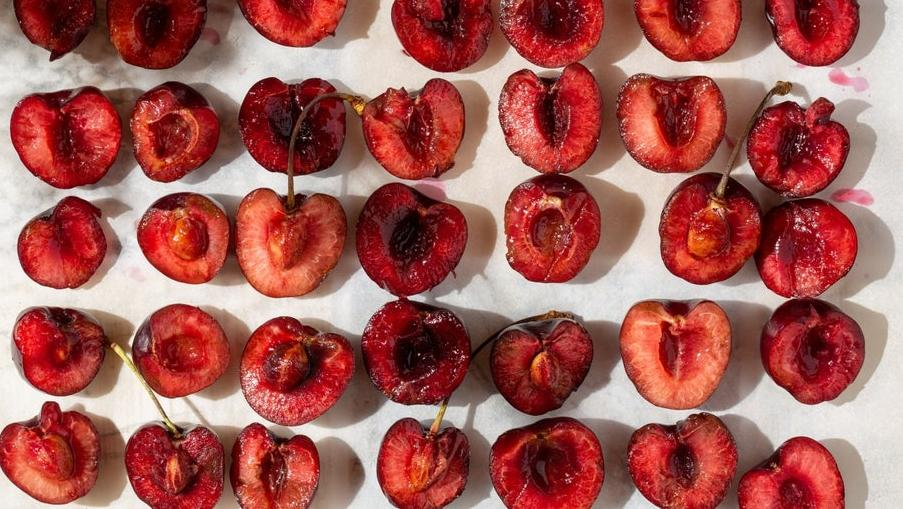Why Fresh Produce Gets Slimy, And How To Prevent It
Don't feel bad—it's not your fault. Just take these steps.
On a recent Sunday, I crept inside from a hot and muggy New Orleans afternoon and headed for the fridge. My dinner menu included a cool cucumber and cherry tomato salad, using produce from the farm box I received the previous week. I'm used to veggies that stay fresh and crisp for a week or more—so imagine my surprise when I reached into the bag of cucumbers and came out with a handful of slime.
Some of the cherry tomatoes, which I normally can count on to last as long as a month, were soft and covered in black spots. What did I do wrong? I thought, firing off an email to my farmer to ask about the spoilage. A day later, I got the answer. It wasn't me, nor was it the way I had stored the veggies. It was the weather.
Why fruits and vegetables grow slimy
Since June, Louisiana has been enduring weeks of 90-degree-plus temperatures, with the heat pouring on much earlier in the year than usual. Many afternoons, we get a thunderstorm with intense rain, enough to cause flash flooding emergencies. Those extremes have afflicted normally reliable crops, sped their ripening, and forced farmers to pick and ship produce sooner than they might ordinarily do so.
It's not just a problem here in Louisiana: Strong storms and intense heat are affecting farms across the country, while flooding is an issue in Ohio, Indiana, Florida, and even up in Alaska. The rain means that normally moist crops like tomatoes, squash, cucumbers, and watermelon are absorbing even more water than they normally hold, meaning that yours may disintegrate faster than usual.
Meanwhile, delays in shipments due to trucking shortages could mean that produce is spending more time confined than normal, shortening its lifespan. There are, however, some steps you can take to safeguard the fruits and vegetables you bring home.
Make sure your produce is thoroughly dry
Since the pandemic began, some people assiduously washed their produce as soon as they brought in the house, thinking they could limit the spread of the virus that way. I'm actually from the "don't wash it until right before you are going to eat it" school, based on advice from Katharine Hepburn.
If you are an immediate washer, make sure that you dry everything thoroughly before you put it away. My cucumbers' collapse was aided by condensation inside their plastic bag. It didn't even occur to me to wipe them down upon arrival, but I will from now on.
Store all produce in a dry spot
I subscribe to the theory that full-sized tomatoes taste best when stored on the kitchen counter, not in the fridge. Likewise, I've always kept onions and potatoes in a cupboard. However, it's important to make sure that the storage area is dry and not exposed to humidity. That's been a problem here in New Orleans, where the humidity is often 50% or higher, even indoors. My last crop of tomatoes looked fine on the surface but were weeping from the bottom when I placed them on a cutting board.
Eat ripe fruits and vegetables quickly
I bring home bright green bananas and avocados, in order to ripen them according to when I plan eat them. But in this summer's heat, they're ripening faster than ever, even with air conditioning. This is a reminder to eat up your ripest produce quickly. The grace period we used to get is vanishing in the face of these hot temperatures.
If you have more ripe produce than you can eat, pop some of it in the freezer, make a cold soup out of it, or roast it (many fruits roast beautifully). Also, don't abandon wilted greens: my mother turned these into a wonderful salad with a bacon and vinegar dressing. And then, of course, there's the option to make Garbage Pesto.
Compost whatever doesn’t keep
Should your fresh produce supply become unsalvageable, assign it to compost. You can invest in a countertop composting bin or check to see if your community allows you to put vegetable peelings and other scraps in with your leaves and lawn debris. Here's a beginner's guide to composting at home.
I whirl blackened bananas, including the peel, in the blender and feed the sludge to rose bushes. It's a shame to lose the money you've invested in shopping or growing, but your disintegrating edibles can help the earth.
Let your farmer or store know about slimy produce
When I reported the problem to my farmer, I received a partial credit on my account. The same might be true at your produce stand or grocery store (Trader Joe's has a great refund policy). Although the information might be unpleasant to hear, farms and stores want to know when things are going wrong, since they need to adjust, too.
